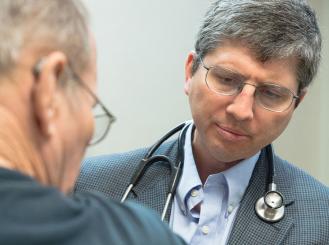Jan 24, 2014
Ralph J. Hauke, MD, has been a partner at Nebraska Cancer Specialists for five years and Medical Director of AseraCare Hospice for 16 years. He is a Special Associate Professor at Creighton University School of Medicine and a Clinical Associate Professor at the University of Nebraska Medical Center.
How did you choose your current career path?
I was drawn to the research potential within oncology and the complexity of patient care. I worked as a general internist for three years but decided on returning to an oncology fellowship. Following fellowship, I stayed in academia for seven years before transitioning to my current practice. The change allowed a better opportunity for clinical research and to continue working with a good friend and mentor.
Is there a personal experience that shaped your professional journey and led you to where you are today?
As a resident, my oncology attending did “bone marrow rounds” in the evenings and he showed me some peculiar erythrocytic inclusions on a consult patient. This led to a seven-year investigation culminating in the identification of an undiscovered bacterium associated with a hemolytic syndrome. It was a great example of research methodology and passion. Now a good friend and partner, this colleague has always exemplified the importance of staying abreast of medical advances and providing compassionate, knowledgeable care.
Describe your typical work day.
I do rounds at one hospital first, usually followed by a meeting or conference at 7:00 AM, then rounds at a second hospital. Clinic goes from 9:00 AM to 5:30 PM. Afterward, I finish inpatient rounds and see new consults. Three to four nights per month, I have evening meetings. In the late evenings I review emails, handle administrative tasks, and do clinic dictations after spending time with my family.
What aspect of your job is your favorite? What aspect is the most challenging?
My favorite part of my job is patient care. Although I still subspecialize in genitourinary tumors and melanoma, my practice allows me to care for relatives and friends of patients with other tumor types, which permits getting to know multiple family members. I can get to know the person and their family well. It’s a very rewarding part of my practice. My biggest frustration is dealing with insurers: despite the professed trend toward “personalized” care, insurers seem to be lumping patients together, making individualization of patient care increasingly difficult.
What do you wish you had known before you chose your career path?
I wish I had been aware of the breadth of opportunity to do clinical and even translational research in the community. I also wish I had known more about the services ASCO provides for early-career oncologists, with opportunities for participation from all types of practices.
Why would you recommend this career path to someone starting out in oncology?
Community practice allows you to tailor your practice according to your interests. Besides robust and challenging clinical work, you can be engaged in a variety of activities. The enterprise is more efficient than working for a large institution. It has the best of both worlds, but be sure you pick a practice with good clinicians who are fair and supportive.
What kind of person thrives in this professional environment?
As you can see from the work schedule, you cannot be afraid of putting in long hours. And you have to enjoy taking care of patients, since patient care is at the core of your work.
Every issue of ASCO Connection: Trainee & Early-Career Oncologists will feature interviews with members representing the exciting variety of career paths in oncology. Is there a path you’d like to see included? Send suggestions to ascoconnection@asco.org.
Photograph by Daniel Johnson

